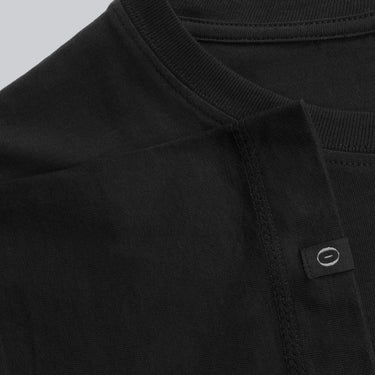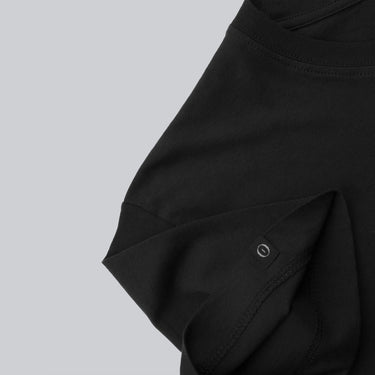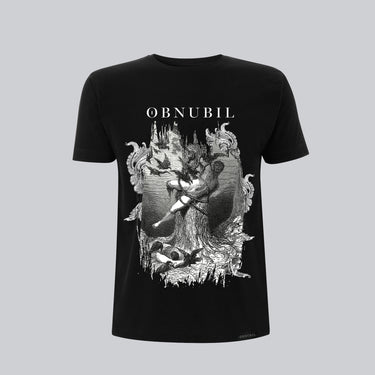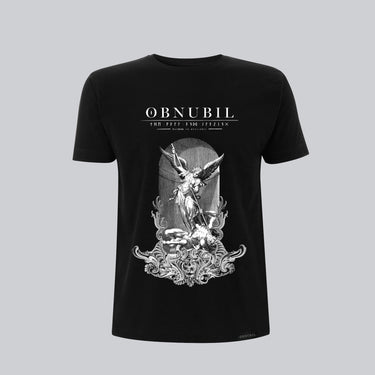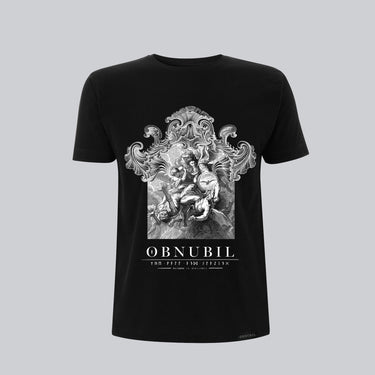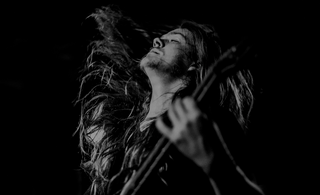
Dutch guitarist and vocalist Dave Meester has carved his path through both the legacy of God Dethroned and the fresh creative vision of his own band, After Taste. Known for his deliberate, concept-driven songwriting, Dave blends precision with emotion, letting ideas mature before a single note is played. As a coach at Metal Factory, he inspires the next generation of musicians while continually evolving his own craft—most recently stepping into vocals and drawing influence from grunge icons and diverse collaborators. With After Taste’s second record out and a third in progress, Dave’s journey is one of constant reinvention and purpose.

INTERVIEW
OBNUBIL: Hi Dave, thanks so much for taking the time — it’s genuinely a pleasure to connect with someone who balances the intensity of the stage with the dedication of teaching and coaching behind the scenes. Between your recent past work with God Dethroned, current project After Taste, your role at Metal Factory and SnaarBarbaar, you seem to live fully immersed in music from all angles. But before we get into the technicalities, riffs, and stage stories, I’d love to start with a broader check-in: how’s life treating you lately, both as a musician and as a person? Have there been any recent moments — in a lesson, on stage, or even outside of music — that shook things up for you or sparked some unexpected creative fire?
Dave: Thank you for having me! Life is treating me quite well lately. I’ve been taking lots of care of my health, both mentally and physically. As a result I’m more focused on creative endeavors than I’ve ever been before. A recent moment that really opened my eyes has to do with a student at the Metal Factory. He’s a very talented musician who’s notoriously hard to coach. Every bit of feedback he receives he brushes off. It seems like he wants to do everything his own way. As a teacher this can be frustrating at times, but as a fellow musician I deeply respect him. It made me realize that, when it comes to art it’s okay to be a total fascist. If you have a clear vision in mind, why would you compromise that for a watered down version? I took this approach to heart in my own work.
OBNUBIL: Today, you're actively shaping the next generation of musicians through your teaching, while continuing to develop your own artistic vision with projects like After Taste—and previously, you held a key role in one of the Netherlands' most important extreme metal bands, God Dethroned. But every journey has a starting point. Can you take us back to the very beginning? What first pulled you into the world of music—not just playing guitar, but fully immersing yourself in it as a passion and a calling? Was there a particular riff, record, live show, or even a personal moment that lit that initial spark? I’d love to hear how those early influences and experiences helped shape the musician, performer, and mentor you’ve become today.
Dave: I remember being in the car with my father. He had a tape cassette with Live Ous Berlin by Rammstein playing. As soon as I heard the opening riff of the song Spiel Mit Mir I was hooked. I immediately dove into their complete discography. Listened to everything religiously. This definitely sparked my passion for music and made me want to play guitar and compose songs myself.
OBNUBIL: You spent a significant chapter of your career as the guitarist for one of the Netherlands' most iconic death metal bands, God Dethroned—a band celebrated for its brutal precision, melodic darkness, and rich historical themes. Looking back, how did you personally approach writing or interpreting guitar parts within such a well-established legacy? Did you ever feel a sense of responsibility—or even pressure—when stepping into that role, knowing the weight of the band’s reputation? And now that you’ve moved on, how has that experience shaped your creative instincts going forward?
Dave: I knew early on that God Dethroned’s fanbase is pretty intense. Some of them know more about the band than I do. So yes there was definitely a sense of responsibility. I wanted to do the material justice and at the same time give my own personal spin to it. Luckily this turned out really well. My sound fit the band perfectly and the response from the audience was always very positive. This experience taught me that I can be confident in my ability as a performing guitar player.
OBNUBIL: Now that you've stepped away from your role in God Dethroned and are fully focused on your own project, After Taste, how would you describe the evolution of your guitar work between those two worlds? God Dethroned had a distinct and aggressive style rooted in blackened death metal, while After Taste seems to explore different textures and emotional depths. Are there particular techniques, compositional approaches, or even mindsets that you've carried over from your time in God Dethroned into your current work? And on the flip side, were there any creative habits or genre conventions you felt eager to break away from as you carved out your own musical identity?
Dave: I think you hit the nail on the head with this question! God Dethroned is very guitarriff-based. Most of the songs were written with a specific guitar part as a starting point. There’s nothing wrong with this approach, but with After Taste I do it a lot differently. All of the After Taste songs originated from a more complete conceptual idea. There’s usually already a lyrical theme and even a song title before the first note is written. I let the musical idea ripen a lot before starting the actual writing process. The guitar riffs serve the song instead of the other way around. As a result I automatically break away from certain genre conventions. Most of After Taste’s guitar riffs are very functional and not very technical. Most of the guitar solos and lead parts are about expressing an emotion rather than shredding as fast as possible.
OBNUBIL: As someone who juggles being a guitar teacher, a band coach, and a performing musician in multiple acts, how does your teaching philosophy bleed into your own practice and performances, which demands both technical control and unfiltered aggression? Do you ever find yourself applying pedagogical techniques to your own band rehearsals or songwriting sessions?
Dave: I try to practice what I preach. Although I must admit that sometimes when I’m helping students in their journey, I know deep down that I sometimes struggle with the same stuff. I guess this is proof that we never finish the learning process.
OBNUBIL: Metal Factory is a truly rare institution—a place where metal is taught seriously. How has your work there shaped your view of the "next generation" of extreme metal guitarists? And how do you prepare them to potentially step into high-caliber bands in the future—not just musically, but mentally and professionally?
Dave: I am extremely ambitious in my view of the next generation of metal guitarists. The amount of talent at our school is ridiculous. My job as a coach has more to do with getting them in the right mindset, rather than teaching them specific guitar techniques. I think because of the age category of most of our students, a lot of the progress to be made has to do with work ethic. The talent is there, the chops are usually there, the will to work hard and set realistic goals and actually achieve something valuable is more challenging. This is something that me and the other coaches take very seriously.
OBNUBIL: If you had to distill everything you are as a guitarist—your technique, personality, influences, and energy—into just one riff, what would it be? It could be something you wrote yourself or even a riff from another artist that feels like it captures your essence. What is it about that particular riff that speaks to who you are as a musician? And what’s the story behind it—where did it come from, and why does it still resonate with you today, whether on stage, in the rehearsal room, or when you’re teaching others?
Dave: I’d have to mention the main riff of “Intravenous” by Killing Joke. It has everything I enjoy about music. There’s a drone element to it - the continuous root note that keeps chugging along. It’s not conventional at all. Dissonant, dirty and still compelling enough to be stuck in your head for ages. This is exactly what I want to incorporate in After Taste.
OBNUBIL: Are there any signature picking or phrasing tricks you use in your leads—like inside/outside picking patterns, circular motion picking, or hybrid picking—that you think often get overlooked by players trying to master fast metal solos?
Dave: I feel like there’s an important distinction between practicing and performing. I don’t want to think about technique or picking patterns while performing. Usually I try to make everything sound as free flowing as possible. So I guess an important element to my lead playing is the use of legato. Something that’s often overlooked by players is muting. You should mute all the strings you don’t use at all times. This will go a long way in making your playing more clear and consistent, thus faster as well, if that’s the goal.
OBNUBIL: If we opened your pedalboard or amp settings on stage, what would we find that might surprise guitar nerds? Do you use any unconventional tricks for tightening your tone in a live death metal context—like EQ pedals, subtle compression, or noise gates in unusual positions?
Dave: This is such a huge cliché of course, but it’s absolutely true: tone is in the fingers. All I use is a good high gain amp, maybe something like a tube screamer to tighten up the sound and a delay pedal with a boost for my solos.
OBNUBIL: After Taste showcases a different side of you, not just as a guitarist but also as a vocalist. How did you first get into singing, and what motivated you to take on vocal duties alongside guitar playing? Was it something you always wanted to explore, or did it evolve naturally from your experience as a musician?
Dave: I first got into singing because of a little demo I made years ago. I recorded some vocal ideas for it so they wouldn’t be forgotten. I showed this to a couple of friends and it sparked the idea to form a new band. This became After Taste and the demo I’m talking about ended up being our song “Follow Me”. When we first started I thought we’d look for an actual singer. But the rest of the band convinced me to take on the vocal duties myself. I still don’t consider myself a “real” singer, as I still have a lot to learn, which is okay! I enjoy the process a lot.
OBNUBIL: Singing and playing guitar simultaneously can be a huge challenge, especially in metal where rhythms and phrasing can be complex. What techniques or practice methods have you found effective for syncing your vocals with your guitar playing in After Taste? Do you find that singing has changed how you approach your guitar playing in any way—maybe in phrasing, dynamics, or emotional expression? Has this made you a more versatile musician overall?
Dave: Rhythm is something I usually don’t have many issues with. I want to be above the material at all times. So any guitar riff I play I want to be able to play perfectly. If I can tap my foot along with the riff, I’ll be able to sing along with the riff as well. A bigger issue when it comes to vocal technique is pitch, this is something I’m working on a lot. I’d say taking on this new challenge is one of the most important things I ever did as a musician. It taught me to be more in tune with the message of the music. Be more expressive as an artist in general.
OBNUBIL: Are there any vocalists or singers, inside or outside metal, who have influenced your singing style or inspired you vocally? How have they shaped your approach? Looking ahead, do you have any plans to expand your vocal work—maybe with collaborations, side projects, or exploring different vocal techniques? How do you see your role as a singer evolving in the coming years?
Dave: I’m very much influenced by the whole grunge movement. Especially Chris Cornell and Layne Staley. I don’t want to pretend I sound anything like them, but their energy and delivery are very inspiring to me. Some other singers that come to mind are Warrell Dane from Nevermore, Jaz Coleman from Killing Joke, and Sivert Hoyem. As far as collaboration goes, we are currently working on a new record that will feature Marcela Bovio, which is very exciting. We also recently started working together with Nina Grimm who will add tons of cool vocal harmonies to our new songs. As time goes on, and I take on more projects as a singer, I feel more secure in my role. I feel like I have more to say and that audiences take time to really listen. This is very exciting and motivating.
OBNUBIL: Looking back, what do you think your younger self—just picking up the guitar for the first time—would say if he could see where you are now? From performing on major stages to developing your own musical voice and mentoring others, which parts of your journey would completely surprise him, and which moments would feel like the natural result of that early passion?
Dave: I was relatively late to the party. I only started entertaining the thought of being a professional musician at around 20. So I’d say my 10 year old self would be very pleasantly surprised if he could see me now. I remember dreaming of having my own band and performing on stage at a local café. So the idea of me performing on Graspop in front of 10000 people would be staggering. Another thing that’s worth mentioning is that I attended Metal Factory as a student as well. I was part of the very first class. The fact that I’m now involved as a coach is amazing.
OBNUBIL: You’ve always been involved in something dynamic—whether it was tearing up stages with God Dethroned, crafting new material with After Taste, or mentoring the next generation at places like Metal Factory and SnaarBarbaar. As someone who seems to thrive on creative momentum, what’s currently on the horizon for you? Are there any upcoming releases, collaborations, tours, or perhaps unexpected new directions you’re especially excited about? What should your students, listeners, and longtime followers be keeping their ears open for in the coming months?
Dave: New After Taste material! Even though the second record has just been released, we’re already working on the third. Like I mentioned before, it will feature Marcela Bovio. I’m very excited about this!
OBNUBIL: Dave, it’s truly been a pleasure hearing your thoughts and getting a deeper look into the many layers of your musical journey—from your work with After Taste to the classrooms and rehearsal spaces where you continue to inspire and guide the next generation of musicians. Before we wrap things up, is there anything you’d like to say directly to those who’ve supported you along the way—fans, students, fellow musicians? Any final thoughts, messages, or words of wisdom you’d like to leave with our readers?
Dave: I want to express my gratitude to everyone I’ve worked with over the years. I feel very blessed with what I’ve achieved so far, and the projects that I’ve been involved in. I can’t wait to contribute more to the music scene!
Interview done August 2025. Cover photo by Ted Gijsman & Michael Bosboom.



